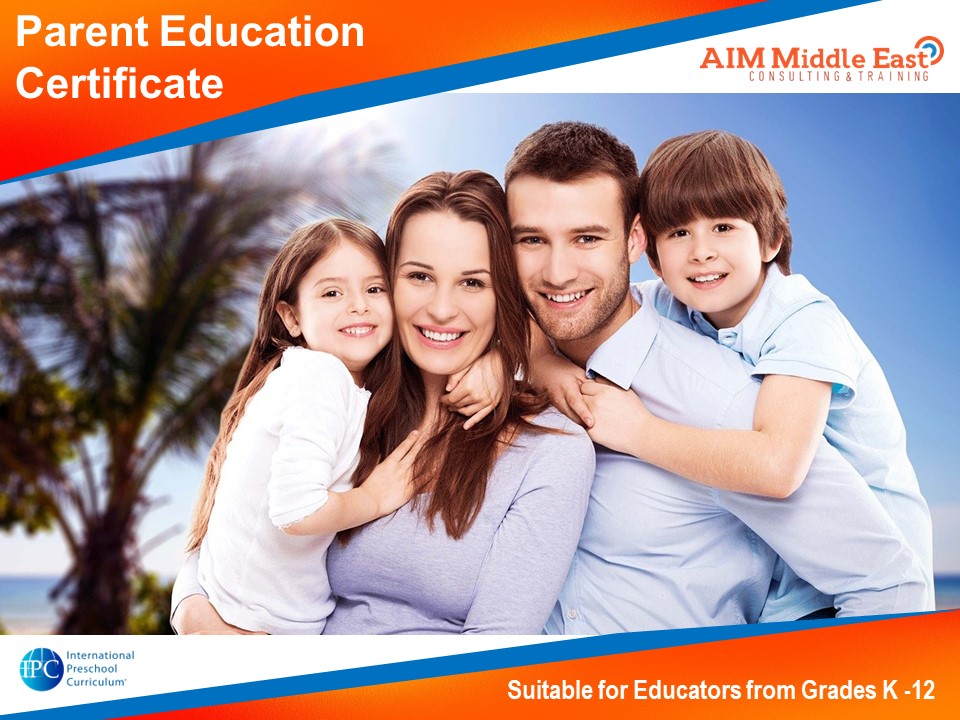Parent Education Certificate for K-12 Educators
PROGRAM OVERVIEW
The IPC’s Parent Education Certificate qualifies participants to effectively provide parental engagement programs within their academic communities.
The program is structured as a series of workshops to equip teachers with the knowledge and skills necessary to understand the importance of parental involvement and deliver effective parent education programs, so that parents can better support the developmental needs of their children.
IPC’s Academic Team has designed its Parent Education Certificate program to enable educators to understand their responsibility as a communicator, role-model and stakeholders. They will be able to identify areas of professional growth by analyzing new knowledge gained and current practices in relation to family engagement. They will examine potential challenges in getting families involved and developing solutions to improve participation. They will also analyze current parent communication practices and plan for ways to enhance communication-based on module theory and workshop discussions

This course is recommended for educators working with school aged children.
ENROLLMENT CRITERIA
- Participants should be over 18 years of age.
- Participants should have at least 12 years of education.
- Participants should be proficient in reading and writing in the English language.
COURSE DURATION
- 8 weeks
LEARNING FORMAT
The IPC Parent Education Certificate is offered through a user-friendly e-portal, designed to maximize the participants’ learning experience, ensure productive self-study and encourage exploration of best international practice. The program is facilitated by our highly qualified faculty to ensure participants are able to successfully convert learning into action and implement new knowledge acquired in their work environments.
PROGRAM COMPLETION
- Access to a computer, laptop, or tablet, and internet connection is required to review and study course materials and for submission of assignments.
- Participate and successfully complete all program requirements and assessments.
REGISTRATION CHECKLIST
- Submit completed registration form via email to info@aimmiddleeast.com
- Submit a copy of passport (or National Identification document) and education certificates.
- Once registration forms have been reviewed and accepted, participants will be requested to pay the registration fees.
PROGRAM CONTENT
The program has two significant components
- Part 1 consists of 3 Modules and develops skills to deliver effective parent education programs.
- Educators for Part 2 will be grouped according to the age of children being taught and aims at developing a deeper understanding of the needs of the children, in order to communicate effectively with parents.
| Family Engagement Programs Delivery | Family Engagement Competency |
|---|---|
Module 1: Professionalism
|
Module 1: Positive Parent – Teacher Partnerships
|
Module 2: Importance of Family Involvement
|
Module 2: Understanding Child Development & Learning
|
Module 3: Effective Presentations
|
Module 3: Meeting Children’s Needs
|
| Pathways for Part 2: | |||
| 1 | Early Years Educators: | Working with children from 0 – 5 years; Up to KG 2/Year 1 | |
| 2 | Primary Years Educators: | Working with children from 6 – 10 years; Grades 1 – 5/ Years 2 – 6 | |
| 3 | Middle School Educators: | Working with children from 11 – 14 years; Grades 6 – 9/ Years 7 – 10 | |
| 4 | High School Educators: | Working with children from 15 – 17 years; Grades 10 – 12/ Years 11 – 13 | |
ASSESSMENTS
Assessments are held throughout the duration of the program and are intended to evaluate both knowledge-based and practical learning. Assessments for each module include:
| 1. Assessment Quiz | 2. Family Engagement Plan |
| 3. Personal Development Plan | 4. Practicum |
| A passing grade is awarded to those who achieve 60% and a distinction is awarded at 90% and above. | |
Pathways for Part 2
| Early Years Educators | Primary Years Educators |
|---|---|
| Working with children from 0 – 5 years; Up to KG 2/Year 1 |
Working with children from 6 – 10 years; Grades 1 – 5/ Years 2 – 6 |
Module 1: Positive Impact of Parent – Teacher Partnerships
|
Module 1: Positive Impact of Parent – Teacher Partnerships
|
Module 2: Understanding Child Development & Learning
|
Module 2: Understanding Child Development & Learning
|
Module 3: Meeting Children’s Needs
|
Module 3: Meeting Children’s Needs
|
| Middle School Educators | High School Educators |
|---|---|
| Working with children from 11 – 14 years; Grades 6 – 9/ Years 7 – 10 |
Working with children from 15 – 17 years; Grades 10 – 12/ Years 11 – 13 |
Module 1: Positive Impact of Parent – Teacher Partnerships
|
Module 1: Positive Impact of Parent – Teacher Partnerships
|
Module 2: Understanding Teen Development & Learning
|
Module 2: Understanding Adolescent Development & Learning
|
Module 3: Meeting Teen Needs
|
Module 3: Meeting Adolescent Needs
|
